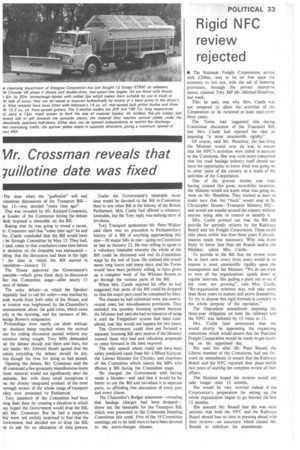Rigid NFC review rejected
Page 35

If you've noticed an error in this article please click here to report it so we can fix it.
• The National Freight Corporation, armed with £200m, was to be set free upon the economy to run riot, with the aid of licensing provisions, through the private enterprise sector, claimed Tory MP Mr. Michael Heseltine, last week.
This, he said, was why Mrs. Castle was not prepared to allow the activities of the Corporation to be reviewed at least once every three years.
The Tories had suggested this during Committee discussion of the Transport Bill, but Mrs. Castle had rejected the idea as imposing "a most unscientific rigidity".
Of course, said Mr. Heseltine, the last thing the Minister would ever do was to ensure that the NFC's activities were called to account in the Commons. She was even more concerned that the road haulage industry itself should not have the opportunity to know what was going on in other parts of the country as a result of the activities of the Corporation.
One of the gravest doubts was that, having created this great, monolithic structure, the Minister would not know what was going on, went on Mr. Heseltine. They wanted at least to make sure that the "buck" would stop in St. Christopher House—Transport Ministry HQ— and would not wander around the country without anyone being able to control or identify it.
Mrs. Castle pointed out that the Bill did provide for periodic reviews by the Railways Board and the Freight Corporation. These could take place within less than three years if circumstances made that necessary. Who was more likely to know that than the Boards and/or the Minister, asked Mrs. Castle.
To provide in the Bill that the review must be at least once every three years would be to impose a most unscientific rigidity upon the management and the Minister. "We do not want to turn all the organizations upside down at regular intervals, like pulling a plant out to see if the roots are growing", said Mrs. Castle. "Re-organization schemes may well take more than three years to mature and prove themselves. To try to impose this rigid formula is contrary to the whole purpose of the operation."
The Opposition amendment imposing the three-year obligation on both the railways and the NFC was defeated by 15 votes to 13.
Mrs. Castle later announced that she would shortly be appointing the organizing committee which would ensure that the National Freight Corporation would be ready to get cracking on the appointed day.
She said this after Mr. Peter Bessell. the Liberal member of the Committee, had put forward an amendment to ensure that the Railways Board and the NFC reported their plans within two years of starting the complete review of their affairs.
The Minister hoped the reviews would not take longer than 12 months.
She would be very worried indeed if the Corporation's preparation for setting up the whole organization began to go beyond the first 12 months.
She assured Mr. Bessell that she was most anxious that both the NFC and the Railways Board should lose no time in pressing ahead with their reviews—an assurance which caused Mr. Bessell to withdraw his amendment.












































































































